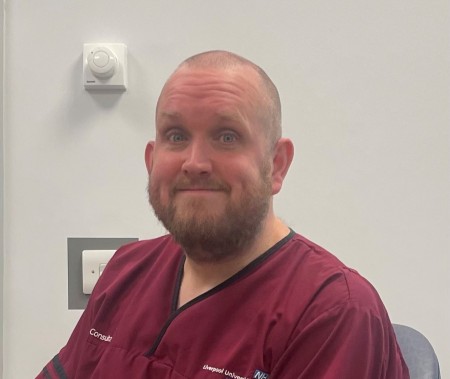Today marks National Cancer Clinical Nurse Specialist (CNS) Day, celebrating a role which is pivotal to providing the smooth coordination and delivery of personalised cancer care for our patients at LUHFT. One nurse who knows all about the importance of the Cancer CNS role is Phil Whelan, who has spent 20 years working at the Royal Liverpool University Hospital – 15 of them as a CNS in pancreatic cancer.

“When I joined the Royal in 2004, I was a staff nurse on the pancreatic ward and I really enjoyed being part of the specialism. Our pancreatic unit is one of only a small number of specialist units in the UK and as my career has grown over the past two decades, so has our unit. At LUHFT we’re doing some incredible things in the management of pancreatic cancer and in some cases providing curative treatment – and the CNS role within that has been huge.
“When I started as a staff nurse there was a standalone CNS that I worked with and she was so inspiring to me - I looked up to her. My journey to become a CNS started from there. It’s hard to quantify exactly what we do, as there is so much scope in what we can provide to patients in terms of care, but physical and emotional support.”
During his time as a CNS, Phil has developed CNS-led models of care for patients who have completed chemotherapy post-surgery to provide expert support and continued clinical monitoring, alongside creating a pancreatic patient support group. The Royal’s “2018 Clinical Nurse Specialist Star of the Year” has also developed a nurse-led clinic for patients with non-surgical pancreatic cancer, so that they are seen by a CNS at diagnosis and provided with a host of support and to plan their continued care.
Phil, who was appointed a Pancreatic Nurse Consultant last year, said: “Whilst we still work and plan patient care with the wider team, there’s now more autonomy for nurse specialists, such as leading their own clinics. The CNS is often the person patients with cancer can consistently rely on for that physical and emotional support. My patients are really important to me, having that daily contact and developing relationships is crucial.
“There are so many different CNS roles across LUHFT – it’s great whenever you see another colleague walk past in the burgundy uniform. I’d say that if you are a nurse with an interest in a specific speciality or disease and are passionate about really developing your nursing career and yourself, then you should look into becoming a CNS. From my experience alone, I know a cancer CNS can make such a massive difference to our patients.”
Find out more about National Cancer Clinical Nurse Specialist Day on the Macmillian website.
